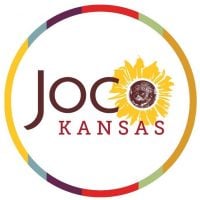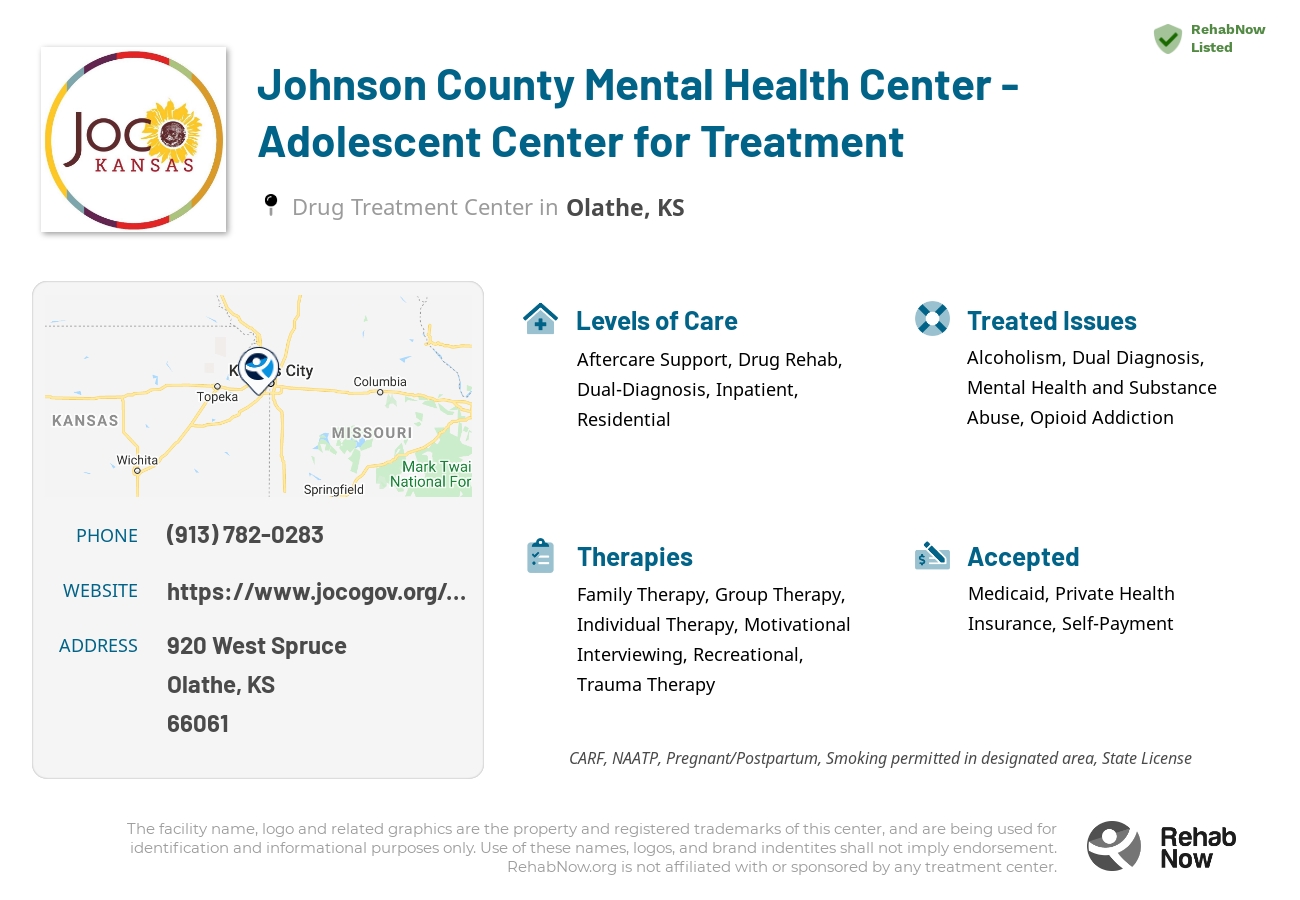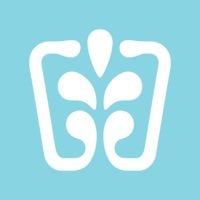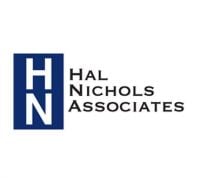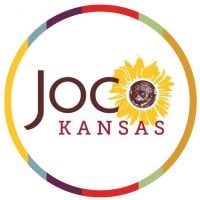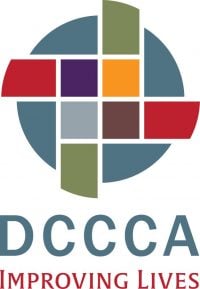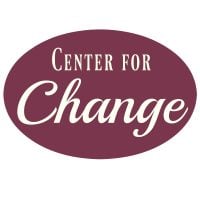Johnson County Mental Health Center - Adolescent Center for Treatment
Drug Rehab Center in Olathe, Kansas
Johnson County Mental Health Center - Adolescent Center for Treatment is an addiction treatment facility located in Olathe, KS that offers inpatient and residential programs alongside aftercare support to assist individuals in their journey to recovery from substance abuse.
About Johnson County Mental Health Center - Adolescent Center for Treatment in Kansas
Johnson County Mental Health Center - Adolescent Center for Treatment is a 30-bed facility located in Olathe, Kansas that provides addiction and substance abuse treatment. The center provides a range of services from detoxification to residential care and focuses on helping individuals successfully manage their addiction and substance abuse issues. Their main treatment methods involve individual and group therapy, pharmacotherapy, medical services, and aftercare support. In addition, the facility is affiliated with Johnson County MHC and is licensed and accredited by applicable state and federal agencies.
The center specializes in helping individuals struggling with Alcoholism, Dual Diagnosis, Opioid Addiction, Drug Addiction, and Substance Abuse. The treatment process is tailored to each individual and may include intensive therapy, individualized medication plans, and medically assisted detoxification. Along with providing outpatient and inpatient levels of care, the center also offers specialized dual-diagnosis and aftercare programs to ensure long-term recovery. The facility is also equipped with resources such as a 24-hour nursing staff and qualified counselors to provide a safe and supportive environment for individuals in recovery.
Genders
Ages
Modality
Additional
Conditions and Issues Treated
Opioid addiction has become a significant health problem in the United States. In 2015, there were 91 opioid overdose-related deaths per day, with a substantial increase in mortality rate in 2014.
When opioid addiction has reached a point where a person’s life becomes unmanageable, treatment options are available to help them get sober. Treatment that includes medical care with medications and counseling can help a user transition into sobriety.
When someone in struggles with both addiction and mental or emotional illness, this is considered a dual diagnosis. Dual diagnosis treatment can include therapy for these issues to happen simultaneously, which will allow either of them to be treated effectively.
Sometimes people who have suffered from addiction disorder also suffer from co-occurring disorders such as depression, anxiety, bipolar disorder, etc., making them “dual diagnoses.” Dual diagnoses require specialized treatment programs where drug and alcohol addiction are addressed along with psychiatric illnesses. Some rehabilitation facilities provide patients suffering from cooccurrences a program with highly integrated services and a clean environment with few distractions to help them succeed.
Levels of Care Offered
This center offers a variety of custom treatment tailored to individual recovery. Currently available are Aftercare Support, Drug Rehab, Dual-Diagnosis, Inpatient, Residential, with additional therapies available as listed below.
Inpatient treatment for alcoholism or drug addiction is an option that provides the addict with a supportive environment in which they can stop using. After detox, an inpatient treatment center provides a structured environment for the addict to recover from their addiction and begin taking steps toward a lifetime of sobriety.
This type of treatment is appropriate for addicts that are most in need of intensive care and supervision. This includes those who were unable to quit on their own, those who need more structure than they can get in outpatient treatment, and those whose addiction has led them into legal trouble or severe health problems.
Residential treatment programs are those that offer housing and meals in addition to substance abuse treatment. Rehab facilities that offer residential treatment allow patients to focus solely on recovery, in an environment totally separate from their lives. Some rehab centers specialize in short-term residential treatment (a few days to a week or two), while others solely provide treatment on a long-term basis (several weeks to months). Some offer both, and tailor treatment to the patient’s individual requirements.
Completing a drug or alcohol rehab program is only the first step. Then comes aftercare support. These services include sober living accommodations, career counseling, and AA/NA programs for those struggling with sobriety or who want help maintaining it after initial rehab at an addiction facility.
They can last up to a year or more depending on what’s needed most urgently after the earlier stages are completed.
Therapies & Programs
Because no single treatment is effective for all addicts, the goal of treatment and therapy should be to figure out what works best for each individual. Tolerance and withdrawal levels differ from person to person, affecting the treatment intensity required. Addiction treatment should aim to help addicts develop healthy coping mechanisms for dealing with their addiction and its underlying causes.
Family therapy is beneficial for people who are in addiction treatment services because it offers addicts the opportunity to work with their family members to better understand what led them to make choices that contributed to their addiction.
This type of therapy helps family members reach a deeper understanding of how they can best support their loved one during recovery. It also helps the addict better understand their own motivations and triggers that led them to turn to substance abuse.
Family therapy can help addicts in the following ways:
- Assists family members in processing difficult feelings so they don’t blame or resent recovering addicts
- Assists family members in understanding how addiction has impacted the addict and everyone who is involved with them
- Allows the addict to take responsibility for their actions, while encouraging improved communication skills
- Helps family members understand how to best support an individual in recovery so addicts don’t relapse again.
Group therapy can help build a stronger support system and give addicts in Olathe, KS insight into their addiction that they gain through shared conversations. Group therapy occurs in a controlled group environment, exclusive of one on one meetings. This makes it safer for patients to feel comfortable sharing the struggles they’re going through and gaining perspective.
Trauma therapy is beneficial for people who are recovering from drug addiction because it helps them heal from past traumas that may have caused them to turn to harmful substances or led them to experience negative emotions that contributed to their destructive behaviors.
This type of treatment works by processing difficult experiences so individuals can learn how to process these events without having to turn to substances for coping.
Trauma therapy can help addicts in the following ways:
- Helps individuals understand their experiences and emotional responses to difficult events, including why they turned to drugs or alcohol
- Provides them with comfort and support while working through difficult emotions related to these traumatic experiences
- Offers an opportunity for addicts to have a voice and be heard, which can improve their self-esteem
- Can help them develop coping skills so they can better respond to triggers instead of turning to substance abuse.
Cognitive-behavioral therapy is a technique that is used to help people with addiction. Specifically, it is a way of identifying thoughts and behaviors that cause the addiction. It is typically used in an individual counseling session.
The content explains cognitive behavioral therapy and how it works to address some behaviors that may be leading to unintended consequences in their life, as well as its benefits for those seeking sobriety.
It works by helping people to talk through their issues and addressing the thoughts that cause said behaviors. It is an excellent way of learning about oneself and one’s perception of the world.
Payment Options Accepted
For specific insurance or payment methods please contact us.
Is your insurance accepted?
Ask an expert, call (888) 674-0062
Johnson County MHC Associated Centers
Discover treatment facilities under the same provider.
- Johnson County MHC - ACT Olathe in Olathe, KS
- Johnson County MHC - Adult Detox Unit in Shawnee Mission, KS
- Johnson County MHC - Outpatient Addiction Services in Olathe, KS
- Johnson County MHC - Outpatient Addiction Services in Shawnee Mission, KS
Learn More About Johnson County MHC Centers
Additional Details
Specifics, location, and helpful extra information.
Olathe, Kansas 66061 Phone Number(913) 782-0283 Meta DetailsUpdated November 25, 2023
Staff Verified
Johnson County Mental Health Center - Adolescent Center for Treatment Patient Reviews
There are no reviews yet. Be the first one to write one.
Olathe, Kansas Addiction Information
About 42% of adults in Kansas have tried an illicit drug at some point in their lives. 12.4% of the state population uses illegal drugs and 4.5% abuse alcohol in a given year. 15.16% of all deaths in Kansas between 2008 and 2017 were caused by either drugs or alcohol.
About 4.6% of all people living in Olathe, KS have an addiction to either drugs or alcohol. Drug overdose deaths as a result of prescription drugs have increased by 100% from 1999 to 2013. The most commonly abused drugs are marijuana and prescription drugs. There are many different types of treatment options available for getting sober in Olathe, Kansas. Some centers offer 12-step programs, while others use more holistic methods.
Treatment in Nearby Cities
- Holton, KS (62.8 mi.)
- Shawnee, KS (11.2 mi.)
- Louisburg, KS (20.3 mi.)
- Seneca, KS (92.9 mi.)
- Winfield, KS (164.0 mi.)
Centers near Johnson County Mental Health Center - Adolescent Center for Treatment
The facility name, logo and brand are the property and registered trademarks of Johnson County Mental Health Center - Adolescent Center for Treatment, and are being used for identification and informational purposes only. Use of these names, logos and brands shall not imply endorsement. RehabNow.org is not affiliated with or sponsored by Johnson County Mental Health Center - Adolescent Center for Treatment.
